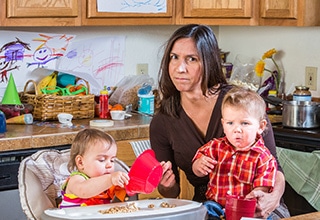
Straining to keep a tiny boat afloat in turbulent seas – that’s how the first post-separation years felt as I co-parented my young sons. Did I know how to row? Not really, but I learned about post-divorce parenting.If that image speaks to you, take heart. The waves get smaller and more predictable. You get better at rowing, build stronger muscles, and find more confidence. You and your children begin balancing in the boat with less effort.
The tumult of emotions which surrounds divorce can be overwhelming. Combine this with the upheaval of creating a new life including living space, finances, perhaps work and even community – that’s what makes the beginning of divorced parenting so stressful. Knowing your children are impacted as well makes it infinitely weightier.
Post-Divorce Parenting Does Get Easier: 7 Survival Strategies
Don’t forget yourself through post-divorce parenting. Taking care of yourself is the most important starting point. What do you need to do?
- Assess yourself: What is your level of physical, mental, and financial health? Write down what’s working and what needs attention. Make sure you slow down enough to get honest answers. When I did this, I realized my mental and emotional health was the weakest area and needed attention.
- Assess your children: Physical health and mental health. It may be hard to know where they are at emotionally, so try asking them different questions like, “How are you doing? Are there things you are confused about? What is the best part of your day/week?” Honestly, I didn’t know enough to ask my children these questions at the time. I observed them, and saw that my younger child looked more quiet than usual.
- Assess your support system: This includes professionals such as doctors, therapists, financial advisors, mediators, lawyers, and teachers as well as your social network of friends, family and support groups. My assessment showed that my two best friends lived provinces away and I’d need to find or develop more local supports. Often times in post-divorce parenting or even in general, you might find that your support systems will change.
- Set priorities in areas like health, financial, legal, educational, social: Choose your top needs, like “Find a new job” and write down the first few actions that will move you forward on that priority. Set timelines for these steps. After moving into an apartment, my top need was to reassure myself that this new life could have fun in it as well as work and worry, so I planned a road trip with my sons to visit our family in British Columbia.
- Decide what you can do for yourself and where you need help: When post-divorce parenting, your support system may include people who are goldmines of information or connections, if you ask for what you need. In my first post-separation year, I needed emotional support and a new job. I called a community resource centre and found a support group for women in transition which turned into a weekly haven for me. To seek a job, I called a former boss and our lunch meeting led to a great opportunity.
- Don’t look too far ahead: Keep your eyes on the coming weeks and months because the unfolding future has lots of unknowns. You don’t need to have all the answers, just the next few steps. For me this was hard to do, some weeks. At other times I was so busy there was no time to worry about the long term.
- Find something which will feed your soul: and do it every week. Go for a walk, curl up with a book, hang out with a few friends, take the kids to some new place for a picnic. Having something to look forward to, even a small thing, can keep you going. When their dad and I separated my sons had lots of after-school activities: soccer, hockey, piano lessons. After a year, I carved out one evening each week to practice with a small musical group from my church. Post-divorce parenting actually gave me more time to do the things I wanted to do. At the musical group, I put aside all my fears and loneliness and for 90 minutes, sang and practiced harmonizing. We weren’t very good, but that didn’t matter. It nourished me, didn’t cost anything, and I heard myself saying one day, “This is the most fun I have all week.”
Music may not be your thing. Perhaps you know what does bring you joy, lets you immerse yourself for awhile. If not, think back to your early years and see if there’s an interest or activity there that you can take a tiny step to rejoin or recapture. There are lessons in almost everything through community centres. Give something a try.
You may notice the thread here is, keep going. Balancing yourself and your children in that small boat may feel impossible at the beginning of post-divorce parenting, but it’s not. It’s just hard. Take a breath, ask for help that you need, and keep rowing.











Add A Comment